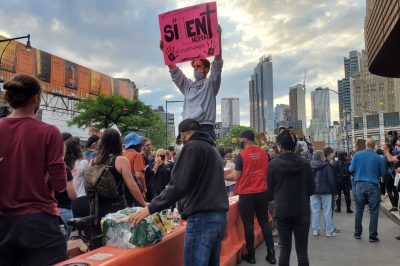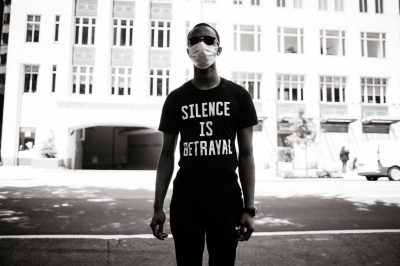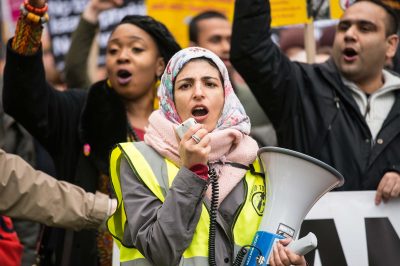To oppress a people, you don’t need to hold them at gunpoint, you only need to convince them that self-repression is social responsibility.
Sometimes we make the mistake of equating patience with spiritual strength. We bear oppression politely in hopes that our quiet resignation will have a transformative effect on our persecutors.
Other times, there is wisdom in being patient. As Muslims, we understand that there is a metaphysical power in self-restraint. We know that God listens to the oppressed. Patience can be prayer.
The Prophet Muhammad taught, “Beware the supplication of the oppressed, for there is no barrier between it and God.”
The prosperity and welfare of an entire nation are at stake when its members fail to protect those who are underprivileged from those who are in power.
Prophet Muhammad once declared, “How would God sanctify a nation that does not protect its underprivileged from its powerful?”
Where Does Power Lie?
As Muslims, we are called to contend with our own demons; our own racism, and prejudice. If we can cry Islamophobia when we talk about the way Muslim minorities are treated in the West, we can certainly check our own hypocrisy and consider how we treat the most vulnerable within our own communities.
As people of faith, we recognize that power is something that can be harnessed in ways that transcend access to instruments of oppression.
There is power in prayer. There is power in patience, and there is power in moral conviction.
Civil Rights pioneer Rosa Parks encapsulated the spirit of moral conviction when she said, “I have learned over the years that when one’s mind is made up, this diminishes fear; knowing what must be done does away with fear.”
The struggle for moral clarity is in knowing that while it is our moral obligation to do everything we can to eradicate oppression, our efforts should not lead to greater evils. And when footage of the arrest of George Floyd showed him pleading for his life with the words, “I can’t breathe”… “please, please, please”, America’s mind was made up. Clarity was achieved.
In cities across the United States, tens of thousands of people have swarmed the streets to express their outrage. Fearless and fed up, the days of polite protests are over!
Black Lives Matter
Multiple mobile phones captured Mr. Floyd’s last words and memorialized what became a rallying cry for those all too familiar with this style of deranged police brutality and a wake call for those who were still in denial.
Before George Floyd, there was 26-year-old aspiring nurse Breanna Taylor who was shot at least eight times by Louisville police officers in her apartment on March 13.
And before her, there was Dominique Clayton, Eric Reason, Walter Scott, Tamer Rice, Yassin Mohamed, and countless others. And let’s never forget Eric Garner who also implored for justice using the same last words, forever etched in the American conscience:
“I can’t breathe.”
Civil rights lawyer Bryan Stevenson explains that there is not one single thing about the death of George Floyd that is extraordinary or new. Not the killing in plain sight or even the complicity of the officers on site. “Everything we are seeing is a symptom of a larger disease,” Stevenson says.
In an interview with the New Yorker, Stevenson reminds us that “We have never honestly addressed all the damage that was done during the two and a half centuries that we enslaved black people.”
Pages: 1 2

